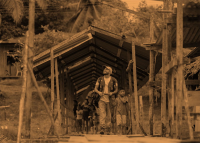PAHO Director to brief ministers of health on microcephaly/Zika in the Americas

The Director of the Pan American Health Organization/World Health Organization (PAHO/WHO), Dr. Carissa F. Etienne, will brief ministers of health from nearly a dozen Latin American countries this week on the current state of the Zika virus outbreak, and the cases of microcephaly—unusually small head size in newborns--and other complications that are suspected of being linked to Zika virus infections.
The high-level briefing follows the declaration this past Monday of a Public Health Emergency of International Concern by WHO's Director-General, due to clusters of microcephaly that have been reported in areas of Zika outbreaks in Brazil. Dr. Etienne is slated to address the ministers at a special meeting on Wednesday convened by Mercosur.
Currently, 26 countries and territories in the Americas are reporting local circulation of the virus, and there is heightened concern that cases of microcephaly and other complications could arise in other countries.
Dr. Etienne will detail efforts to date by PAHO and its member countries to rapidly detect and respond to the spread of Zika virus and to better understand the relationship between Zika, microcephaly and other complications. She will also explain what the declaration of a Public Health Emergency of International Concern means for country and regional action going forward. In announcing the public health emergency on Monday, WHO Director-General Margaret Chan cited the urgent need to coordinate international efforts to investigate and better understand the relationship between Zika, microcephaly and other complications.
The head of PAHO's Epidemic Alert and Response unit, Dr. Sylvain Aldighieri, will also brief the ministers of health on the epidemiological situation of microcephaly and Zika virus in the region of the Americas.
Since October 2015, Brazil has reported more than 4,000 suspected cases of microcephaly in areas with circulation of Zika virus. Brazil first reported local transmission of Zika virus in May 2015. Since then, PAHO/WHO has been collaborating with Brazilian health authorities, mobilizing its own staff and external experts through the Global Outbreak Alert and Response Network (GOARN).
In addition, PAHO has been carrying out technical missions to other member countries to help them prepare for and respond to Zika virus and the possible emergence of cases of microcephaly. PAHO has provided guidance on surveillance and clinical management of Zika cases, laboratory detection of the virus, vector control, surveillance of microcephaly and other neurological syndromes, and risk communication. PAHO is also partnering with Brazil's Ministry of Health, the Oswaldo Cruz Foundation (Fiocruz), the US CDC, and the international Pasteur Institute network to promote much-needed investigation on the Zika virus and its effects.



